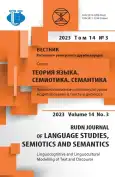Linguistic Analysis of a Literary Text as the Key to its Comprehension: Cognitive and Discoursive Aspect
- Авторлар: Myaksheva O.V.1
-
Мекемелер:
- Saratov State University
- Шығарылым: Том 14, № 3 (2023): LINGUOCOGNITIVE AND LINGUOCULTURAL MODELLING OF TEXT AND DISCOURSE
- Беттер: 704-718
- Бөлім: COGNITIVE RESEARCH
- URL: https://journal-vniispk.ru/2313-2299/article/view/323412
- DOI: https://doi.org/10.22363/2313-2299-2023-14-3-704-718
- EDN: https://elibrary.ru/RIUGZG
- ID: 323412
Дәйексөз келтіру
Толық мәтін
Аннотация
Structural and semantic linguistics has accumulated colossal experience in the systematization of language units, the relationships between them, has formed a unified view of the language as a complex system. Cognitive and discursive paradigm in linguistics has made it possible to explain linguistic and speech characteristics with the context and attracted the cognitive nature of the linguistic sign as a full-fledged component of analysis. Transferring the idea of anthropocentrism to the figure of the second participant in communication, it came to the conclusion that the last component plays large role in the communicative interaction between addresser - text - addressee, and that the interpretive potential of the text depends on the cognitive abilities of this addressee and his discursive baggage. In the/given article the listed characteristics of the state of modern linguistics made it possible to try to identify an interdependent relationship between the structural and semantic characteristics of language units selected by the author of a literary text from the arsenal of the language and woven into its syntagmatics, and the cognitive and discursive «subtext» that linguistics extracts from the text, which helps expose the author’s intentions more clearly. The material for the analysis made fragments of works by the classical Russian literature authors (I.A. Bunin, I.A. Goncharov, M.M. Prishvin, A.P. Chekhov), structural and semantic analysis was used as a leading method, supplemented with elements of content and discourse analysis. The novelty of the research lies in the desire to make a linguistic analysis of the speech canvas of a literary text in the context of new explanatory «horizons» that have opened up due to the cognitive-discursive paradigm. The study of the linguistic «details» of specific fragments of literary texts has shown that the interpretation of a literary text is based on the characteristics of linguistic units (morphemes, words, word forms, syntactic constructions, CSI, etc.) described in detail within the framework of the structural and semantic paradigm, expanding the view of the contextual environment (in this case - already broad context) allows introduce into the interpretation arguments that depend on the interpreter’s own reading and within his value system.
Авторлар туралы
Olga Myaksheva
Saratov State University
Хат алмасуға жауапты Автор.
Email: myaksheva.ov@gmail.com
ORCID iD: 0000-0003-2553-8555
D.Sc. (Philology), Associate Professor, Professor of the Department of Russian Language, Speech Communication and Russian as a Foreign Language, Institute of Philology and Journalism
83, Astrakhanskaya str., Saratov, Russian Federation, 410012Әдебиет тізімі
- Nikolaeva, T.N. (1998). Text. In: Russian language: Encyclopedia. Moscow: Great Russian Encyclopedia: Drofa Publ. (In Russ.).
- Chernyavskaya, V.E. (2021). Linguistics of the text. Discourse linguistics. Moscow: Lenand Publ. (In Russ.).
- Teliya, V.N. (1986). The connotative aspect of the semantics of nominative units. Moscow: Nauka (In Russ.).
- Kotyurova, M.P., Tikhomirova, L.S. & Solovieva, N.V. (2011). Idiostylistics of scientific speech. Our ideas about the speech individuality of a scientist. Perm: West Ural Institute of Economics and Law publ. (In Russ.).
- Kotyurova, M.P. & Solovieva, N.V. (2019). Modern scientific text (through the prism of discursive changes). Moscow: Flinta. (In Russ.).
- Romanova, T.V., Vinokurova, A.S. & Malikova, D.A. (2021). Cognitive-discursive analysis of new spheres and genres of communication. Nizhny Novgorod: Decom Publ. (In Russ.).
- Shustrova, E.V. (2013). Methods of cognitive-discursive analysis of a literary text. Pedagogical education in Russia, 6, 166–171. (In Russ.).
- Kubryakova, E.S. (2012). In Search of the Essence of Language: Cognitive Research. Institute of Linguistics (Russian Academy of Sciences). Moscow: Znak. (In Russ.).
- Vinogradov, V.V. (1963). Stylistics. Theory of poetic speech. Poetics. Moscow: Academy of Sciences of the USSR Publ. (In Russ.).
- Toporov, V.N. (1983). Space and text. In: Text: structure and semantics. Moscow: Nauka, рр. 227—285. (In Russ.).
- Dibrova, E.I. (1998). Categories of artistic text. In: Semantics of language units: reports of the VI International Conference. Moscow: SportAcademPress Publ. Vol. 2. pp. 250–257. (In Russ.).
- Language and national consciousness. Questions of theory and methodology. (2002). Voronezh: Voronezh State University Publ. (In Russ.).
- Kostomarov, V.G. (2005). Our language in action: Essays on modern Russian stylistics. Moscow: Gardariki Publ. (In Russ.).
- Lomakina, O.V., Mokletsova, I.V. & Urazaeva, K.B. (2021). Analysis of a literary text in the light of cognitive linguistics. Cognitive Language Studies, 4(47), 571–578. (In Russ.).
- Myaksheva, O.V. (2019). Text as a “middle component” of the communication process between the addresser and the addressee. In: Efficiency of communication: the concept, the role of the addresser and the addressee, the main methods of achieving it. Saratov: Nauka. pp. 36–51. (In Russ.).
- Myaksheva, O.V. (2001). Textual conceptualization of space (based on works of art). In: Principles and methods of research in philology: The end of the 20th century. Saint PetersburgStavropol: Saratov State University Publ. Vol. 6. pp. 363–370. (In Russ.).
- Lomakina, O.V. (2015). Phraseocontect: from the theory of study to the practice of interpretation. Philology and Culture, 4, 92–97. (In Russ.).
- Goncharova, E.A. & Shishkina, I.P. (2005). Text interpretation. German. Moscow: Vysshaya shkola. (In Russ.).
- Sidorov, E.V. (2009). Discourse ontology. Moscow: Librokom Publ. (In Russ.).
- Akopyan, K. S. & Ogannisyan, T. D. (2021). Constructions with creative comparison in the poetry of Anna Akhmatova. In: International Scientific Congress “Russian Language in the Global Scientific and Educational Space”. Moscow: Pushkin State Russian Language Institute Publ. pp. 52–58. (In Russ.).
Қосымша файлдар









